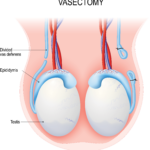A Guide to Vasectomy
There is a wide range of contraceptive methods that are being used all over the world. Some of them are more effective than others and have lesser side effects. The choice of a contraceptive method is made as per the requirements of the person, and various factors like comorbidities, family completion, and age are considered. Vasectomy is also a highly effective contraceptive method.
Let’s know the details about vasectomy.
What is Vasectomy?
Vasectomy is a male contraceptive method. It is a minor surgery that blocks sperms from coming out during ejaculation. This procedure has a high success rate, and there is only less than 1% chance of getting pregnant after vasectomy. It is a permanent procedure and carried out when a person or couple does not want to have kids at all.
What are the Benefits of This Procedure?
This procedure has following advantages.
- It is a permanent procedure. You do not need to take pills, use condoms, or get it done again.
- It is a small procedure with high success rate.
- It does not affect your sexual performance.
- It is less costly than female sterilization method, i.e. tubal ligation.
How is Vasectomy Carried Out?
Vasectomy is a small office procedure that does not take long. It is carried out under local anesthesia. You can also be sedated if you are nervous or there is some other indication. A small incision is made to reach spermatic cord, the tube-like structure through which sperms travel from testis. Once spermatic cord is found, it is either ligated or a small piece is cut out to interrupt the continuity. The skin is closed afterwards. This procedure is repeated on the other side too.
Is This Procedure Painful?
As mentioned above, this procedure is carried out under local anesthesia, so you do not feel any pain. However, once the effect of anesthesia wears off, you can feel a little pain that can be controlled with your pain medications that will be prescribed by doctor. You will be completely pain-free in maximum a week.
What to Expect After Vasectomy?
You will feel mild pain and discomfort, and your doctor will prescribe you a painkiller for that. Also, there can be redness and swelling that can be treated with ice packs. You can also wear supportive undergarments to ease your symptoms. It takes less than a week for these symptoms to disappear.
When Can You Resume Your Normal Activities?
Well, it is an office procedure with very short recovery time. You can resume your daily activities right after the procedure. However, there will be mild discomfort, and you will be advised to avoid heavy activities and sex for a week.
When Can You Have an Unprotected Sexual Intercourse?
You are advised to use some other contraceptive method, such as condoms, right after the procedure because there are chances of getting pregnant. It takes some time before you stop ejaculating sperms. Your urologist will perform semen analysis to confirm that you are sterile. It can take up to three months, so make sure that you are employing another method to ensure contraception.
What Can be the Complications of This Procedure?
Vasectomy is a simple procedure with high success rate. However, like any other surgery it can also have some complications.
- The most common complication can be infection. If you feel excessive pain, swelling, redness, or fluid oozing out from the incision site, then see your doctor immediately. These are the signs of infection.
- Sometimes, a lump or swelling can form due to the collection of sperms. It is a benign swelling and called sperm granuloma. It does not cause any symptoms.
- The failure of vasectomy is another complication. However, the chances of failure are very low, i.e. less than 1% only.
- Epididymis is a structure present above and behind the testicles. Its inflammation, called epididymitis, can occur as result of vasectomy. It presents with pain, swelling, and redness.
Regular follow-up with your doctor and following instructions properly can reduce the risk of complications.
Talk to your partner and make up your mind before you undergo this procedure because it is irreversible. The reversal surgery can be performed but there is no guarantee that it will work. Also, the reversal surgery is more complicated and expensive. It involves repairing the spermatic cord by stitching patent ends together. However, this surgery might not be successful.








